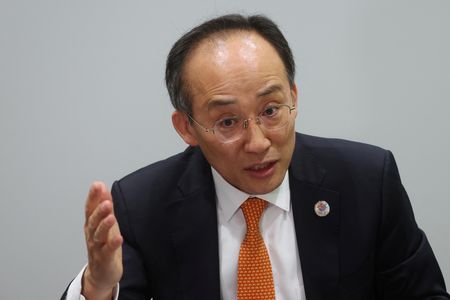 1
1 1
1
By Jihoon Lee
SEOUL (Reuters) – South Korea on Thursday proposed tax cuts to encourage companies to shift operations back home and nurture the biopharmaceutical and visual entertainment industries, to stimulate domestic growth and reduce reliance on traditional manufacturing sectors.
The country with the world’s lowest birth rate would also increase financial support for marriage and home-buying and raise childcare subsidies, among other annual tax code revisions proposed by the finance ministry.
The 31 proposals will reduce tax revenue by 471.9 billion won ($371.50 million) over the next five years, the ministry estimated. That compared with 13.1 trillion won for proposals last year, which were only partially approved by parliament where the main opposition party holds a majority.
“Because there was a large-scale tax reform last year, the government has prepared a tax code revision bill that is as revenue-neutral as possible,” Finance Minister Choo Kyung-ho said at a briefing on Monday before Thursday’s official release.
The proposals come as slowing economic growth is yielding lower tax revenue. The government expects the economy to grow 1.4% this year – the least in three years – and 2.4% in 2024.
The ministry proposed that corporate income tax exemption for re-shoring companies – those who invest domestically to return production from overseas – be 100% for seven years and 50% for the following three years, up from five and two years.
It said tax exemption rates for visual content production should be raised to a maximum 30% from 3-10%, and that the biopharmaceutical sector should be added to a list of industries eligible for higher tax breaks on investment.
While parent-to-child gifts are taxable above a certain threshold, the ministry proposed that a current exemption should be tripled if the money is for marriage purposes. It also said childbirth and childcare incentives should double, and proposed income tax deduction for mortgage payments be raised.
The ministry said most of the tax revenue shortfall would come from increasing childbirth subsidies, which it proposed to raise by 25% to a maximum of 1 million won per child, with easier criteria.
The proposals will be submitted to the National Assembly by Sept. 1 for approval, and will require revisions to 15 tax codes, the finance ministry said.
($1 = 1,270.2600 won)
(Reporting by Jihoon Lee; Editing by Christopher Cushing)